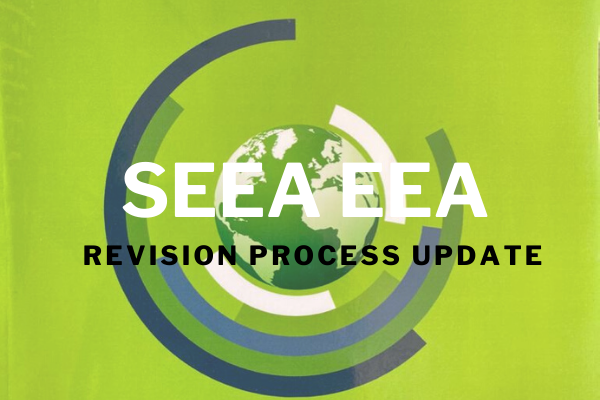SEEA Experimental Ecosystem Accounting (SEEA EEA) Revision, Q1 2020 Update

Since the last update on the SEEA EEA Revision process in November 2019 there has been significant progress achieved in the areas on ecosystem services and valuation with several discussion papers being finalized, furthermore the SEEA EEA revision process moved into drafting and releasing the chapters of the revised SEEA EEA and testing of the conditions concepts has begun.
Drafting of the chapters of the revised SEEA EEA is now in full swing under the careful supervision of the SEEA EEA Technical Committee. The first set of three chapters was drafted by the editor, reviewed by working groups 1 and 2 and approved by the Technical Committee for the first global consultation on individual chapters which was launched on 24 March 2020 by Mr. Stefan Schweinfest, director of the United Nations Statistics Division (see letter and cover note). The global consultation on individual chapters started with the Chapters 3, 4 and 5 on spatial units, ecosystem extent and ecosystem condition, respectively, and will continue until June 2020 with the remaining chapters of the revised SEEA EEA. All comments on chapters 3-5 should be provided using a comments form, to be sent to seea@un.org by 30 April 2020 (see all documents on the revision website).
Working group 2 on ecosystem condition has initiated testing of the ecosystem condition concepts developed during the revision process. A group of approximately 10 countries has volunteered to carry out testing by constructing accounting tables to report the condition of at least one ecosystem, depending on the availability of data and methodology. The outcome will, in turn, feed into the revision process specifically on the condition framework developed. Detailed instructions and an initial presentation were prepared by the working group. First results of the testing should be available in May 2020. Following the same example, working group 1 is also planning to start testing the IUCN Global Ecosystem Typology (IUCN GET) as the proposed international reference classification, and cross walking it to other national and international classifications. The concept note and instructions for the testing are currently under development, and it is foreseen that the testing will start by the end of April.
In the area of ecosystem services, two discussion papers “Proposed concepts, definitions and terminology for ecosystem services for the revised SEEA EEA” (DP3.1) and “Treatments for selected ecosystem services and related flows for the revised SEEA EEA” (DP3.2) have been finalized in February 2020 and distributed for a broad expert group review that has concluded on 31 March 2020. The working group 5 on valuation and accounting treatments has finalized three discussion papers in November and December 2019: DP5.3 on accounting treatments, DP5.4 on degradation and DP5.5 on ecosystem disservices and externalities. The broad expert review finalized for the three papers, receiving approximately 20 comments each from a wide range of experts. It was decided that the discussion papers will not be updated per se, but the comments were discussed at the Technical Meeting on Valuation and Accounting for the revised SEEA EEA that took place on 16–18 March 2020 over WebEx, and will feed directly into the valuation chapters.
Subgroup on Accounting for Biodiversity in the SEEA EEA was established by the SEEA EEA Technical Committee to support the SEEA EEA revision in further bridging the gap in terminology and understanding between the biodiversity and the environmental-economic accounting communities, spanning membership from both communities. The subgroup has 14 expert members and has met twice so far, on 5 February and 25 March 2020. The group’s work plan is, in the sort-term, centered around providing comments on draft chapters from a biodiversity perspective and identifying issues on the integration of biodiversity in the SEEA EEA that may be missing in the chapters and need further research. During the last meeting the subgroup discussed chapters 3 and 4 in detail and provided constructive comments on representing biodiversity in these chapters.
The London Group on Environmental Accounting also became more engaged with the SEEA EEA revision. A set of meetings of the London Group on the revision topics has been scheduled for the coming months. The main purpose of these meetings is for the London Group to discuss the draft chapters and provide their technical input into the drafting of the revised SEEA EEA.
For all up to date information, materials and documents please regularly check the SEEA EEA revision dedicated website at: https://seea.un.org/content/seea-experimental-ecosystem-accounting-revision
